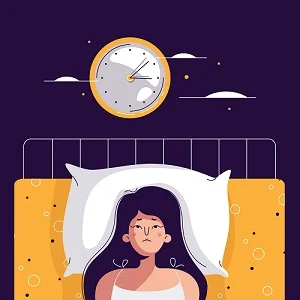
Iron deficiency affects over two billion individuals worldwide. Iron is essential for oxygen transport, cellular respiration, immune function, neurotransmitter metabolism, and DNA synthesis in all living organisms. Iron deficiency can result in anemia, uncommon fatigue, headaches and vertigo, restless legs, poor immune function, and pica, among other health issues. In addition to causing anemia, iron deficiency can impair erythropoiesis.
A growing body of evidence indicates that iron plays a crucial role in neurologic function and development. Iron Deficiency Anemia (IDA) causes a lack of myelination in the brain and a dysfunctional monoamine metabolism.
There is increasing evidence that IDA is associated with adverse psychomotor function, decreased work capacity, delayed socioemotional development, and psychiatric morbidity, such as anxiety disorders, depression, bipolar disorders, sleep disorders, and restless legs syndrome.
ANEMIA
Anemia is characterized by an abnormally low number of functional red blood cells in the body.
It may occur if you:
· Do not produce enough red blood cells
· Destruction of healthy erythrocytes
· Loss of healthy red blood cells
Red blood cells are essential for life. They transport oxygen from the lungs to the remainder of the body's organs, where it is used to produce energy. Hemoglobin is the protein inside red blood cells that transports oxygen. When these cells return to the lungs, they transport carbon dioxide, a noxious byproduct, so that the body can exhale it.
If you have anemia, your red blood cells are insufficient, indicating your body is not receiving enough oxygen.
This may result in a number of symptoms, including:
· Weakness
· Excessive fatigue
· Headaches
· Irritability
· Loss of appetite
· Problems with concentration
· Cold hands and feet
· Numbness and tingling in the extremities
There are numerous varieties of anemia, with iron deficiency anemia being the most common. Hemoglobin requires iron as a crucial component.
DEPRESSION
Experts in the field of medicine do not know the exact cause of depression. However, they have identified several risk factors that can increase a person's likelihood of developing the condition.
· stress
· drug or alcohol use
· a family history of depression
· life-changing events such as divorce, financial problems, relocation, work issues, and grief
· use of certain prescription drugs such as interferon, beta-blockers, and corticosteroids
Anemia and Depression: Evidence
The relationship between anemia and depression is complex. The physical symptoms of anemia, such as fatigue, weakness, and difficulty with daily activities, can contribute to feelings of sadness. More directly, the lack of oxygen in the brain caused by anemia can affect how the brain functions and lead to mood disturbances and depression.
On the other hand, depression can also lead to anemia by affecting appetite and food intake, causing poor nutrition, or increasing the risk of gastrointestinal bleeding. Additionally, certain medications used to treat depression can cause anemia as a side effect. Several studies have been conducted looking at the connection between anemia and depression, but so far, it has not been determined which one comes first.
Preventing Depression Related to Anemia
While more research is required to comprehend the relationship between anemia and depression, it is widely accepted that anemia should be prevented for both physical and mental health reasons. Thus, it is essential to promptly diagnose anemia.
If you have symptoms of anemia, the best course of action is to consult a physician. The condition can be diagnosed through a physical examination, a review of your medical history, and a straightforward blood test. If anemia is detected, they will also investigate the underlying cause.
If diagnosed with iron deficiency anemia, depending on the severity of the deficiency, effective treatment can be initiated to raise iron levels in the blood.
The treatment options are:
· Iron supplements
(tablets, liquids, or iron intravenous injections)
· Iron-rich diet
The small intestine absorbs iron derived from dietary sources. Red meat, fortified cereals, lentils and legumes, dark leafy vegetables, and dried fruit are iron-rich foods.
Treating and Managing Anemia and Depression
Several methods exist for managing both anemia and depression..
1. Diet
If a person has anemia and de A doctor will recommend a healthy, balanced, iron-rich diet that includes nuts, seeds, seafood, and dark leafy greens for an individual with anemia and melancholy.
In addition, they will recommend consuming vitamin C-rich foods and avoiding iron-blocking foods.
2. Exercise
A physician may suggest light exercises to enhance blood circulation and prevent fatigue.
According to the National Health Service (NHS) of the United Kingdom, 150 minutes of moderate-intensity exercise per week can boost a person's mood and vitality.
3. Iron supplements
In a 2020 study, anemia patients who took iron supplements as prescribed reduced their risk of psychological illnesses.
Iron toxicity can result from excessive iron supplementation.
4. Improving sleep
A mere 2015 study reveals iron deficiency anemia may influence sleep quality. Experts link depression to inadequate sleep.
Sleep hygiene practices like:
· reducing exposure to natural light
· limiting TV and phone use before bedtime
· avoiding caffeine before bedtime
5. Therapy
Psychotherapy or talk therapy can assist individuals in identifying potential causes of depression.
It can also help them develop effective coping strategies for depression. A variety of psychotherapeutic approaches are available, such as cognitive behavioral therapy, interpersonal therapy, and psychodynamic therapy.
Sometimes, anemia and depression can be managed by dietary practices alone. However, certain forms of anemia and depression can be fatal and may necessitate more intensive treatment protocols.
According to research, anemia is associated with an elevated risk of depression. This could be caused by a lack of oxygen and physical activity as a result of anemia.
A person should contact a physician immediately if they experience symptoms of anemia, melancholy, or both.
REFERENCES:
https://psychcentral.com/depression/anemia-and-depression
https://bmcpsychiatry.biomedcentral.com/articles/10.1186/s12888-020-02621-0
https://healthmatch.io/anemia/can-anemia-cause-anxiety-and-depression#what-is-anemia